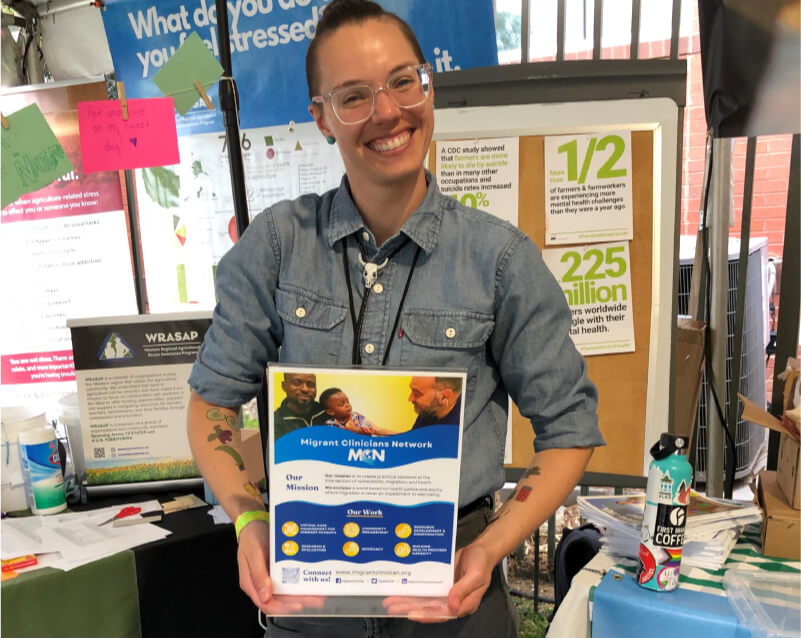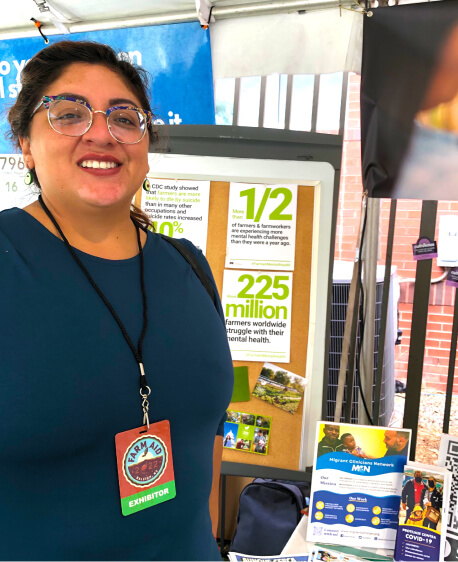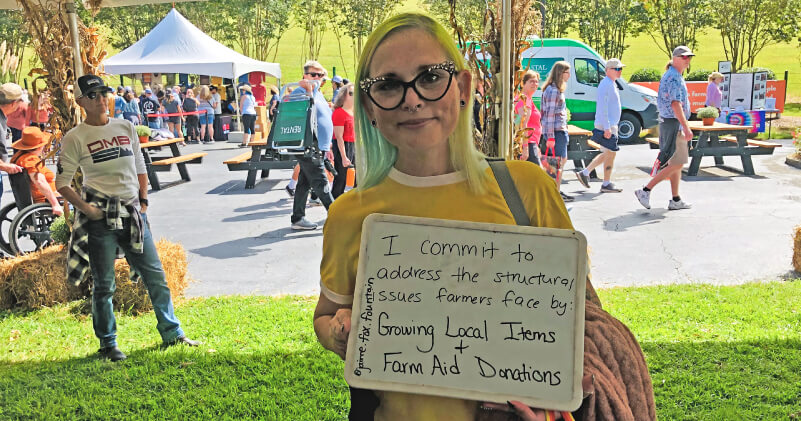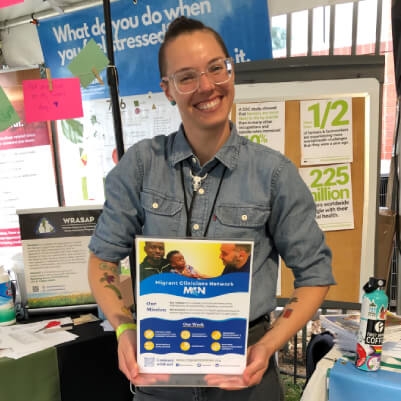Farmers Voice Concern Over Climate Crisis, MCN Provides Education at Farm Aid

Farm Aid staff showing support for MCN’s mission.
At last week’s Farm Aid, participants enjoyed performances by top acts like Willie Nelson and Sheryl Crow, interspersed with stories from farmers on their needs in an age of climate crisis. This year, Migrant Clinicians Network joined partner organization Cultivemos to present our resources and perspectives as part of the exhibition tables. As music blasted from the main stage, I had the opportunity to meet and greet people whose concerns and advocacy work match the MCN’s. For hundreds of visitors to the booth, I shared our efforts to push forward health justice for migrants, immigrants, and asylum seekers, including farmworkers, whom we know are faced with multiple challenges that threaten their mental health. I shared, the Cultivemos mission and work that with MCN, conjointly with Farm Aid, are building a resources warmline for Latinx farmers and farmworkers, as part of a USDA effort to address farmer and rancher stress. The resources line is an 800 number where Spanish-speaking farmers and farmworkers can call for assistance in finding mental health resources and services available in their community, in Spanish. I also displayed our Aunque cerca… sano comic book, which targets migrant and seasonal farmworker families to educate parents about children's risks to pesticide exposure and ways to minimize these risks, as well as our 2021 Impact Report that showcases MCN’s impact on lives across the nation. People were particularly drawn to our colorful and informational comic book.

MCN's Renée AboAmshe at the Farm Aid event.
On stage, farmers and fishers from North and South Carolina shared how the climate crisis is affecting their work, health, and family in ways unimaginable. One fisher from South Carolina noted how the fishing industry is being impacted by climate change due to the rising temperatures, as oceans absorb the excess heat from greenhouse gas emissions. Warming waters and shifting currents affect fish habitat. While the fisher share that he has adopted sustainable fishing practices, it has become very difficult for his company to manage due to little support from government agencies to mitigate climate change challenges. One farmer said, “if you're looking at the average farmer, you're looking at a lot of the minority farmers; they don't have the dollars to reinvest back in the farms to do climate-smart agriculture and nobody's given out money to do that.”
The Farm Aid festival advocates for farmers every year – but this year, farmers are on track to receive a large boost in the Inflation Reduction Act, which will pour $20 billion in federal assistance to help farmers use conservation methods like no-till and cover crops to build their soil, which in turn conserves water and sequesters carbon while improving crop yields.

As Farm Aid’s speakers demonstrated, farmers are beginning to change their tone on climate change. A recent survey of Iowan farmers found 80% of them believe climate change is occurring, a massive shift from just a few years ago. Heat waves, floods, droughts, fires, and other disasters are affecting farmers’ productivity – and they are clearly paying attention.
Migrant Clinicians Network was there to remind farm advocates and concertgoers that, as the effects of the climate crisis become evident on US farms, the health of farmworkers must be preemptively supported. Heat that kills crops also kills farmworkers, even though heat-related illness is fully preventable with rest, water, and shade. Floods leave standing water, which can lead to contaminated water sources, waterborne illnesses like leptospirosis, or mosquito-borne diseases like dengue. Farmworkers – often migrants or newly arrived immigrants – have numerous barriers to getting culturally relevant and linguistically appropriate health information, and if they fall sick, they frequently have significant obstacles to obtaining affordable, high-quality care. MCN works diligently to remove these barriers, and advocates for their needs, like at Farm Aid.

Attendee Jaime Fox shares their commitment to address the structural issues that farmers face.
Yet despite the adversities that farmers and farmworkers are facing, the farmers on stage showed they are resilient, working tirelessly to make sure that they implement sustainable practices. “We do this out of a passion; it is a passion. It is about a legacy that our parents left behind. We are doing what is right for the environment,” stated one farmer on stage.
As Farm Aid concluded, the message was loud and clear: climate change magnifies inequality, and affects our food supply, not to mention that with extreme temperatures farmers and farmworkers are increasingly affected by the grueling summer heat at the peak of the harvest. While working at MCN, I have the opportunity to carry this message, I want and hope that everyone out there becomes a voice and an ambassador of sustainable practices, advocacy, and be the voice of change to support our most-needed treasure, those who grow and harvest our food. If we join forces, we can be the change we need for today, and for our future.
- Log in to post comments

